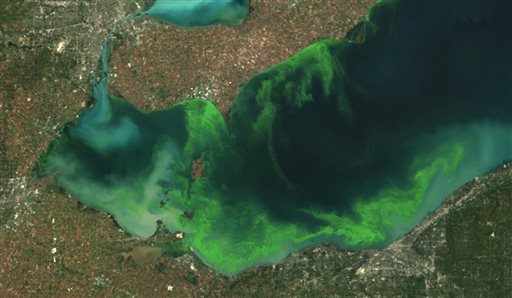
This satellite image provided by NOAA shows the algae bloom on Lake Erie in 2011 which according to NOAA was the worst in decades. The algae growth is fed by phosphorus mainly from farm fertilizer runoff and sewage treatment plants, leaving behind toxins that have contributed to oxygen-deprived dead zones where fish can’t survive. The toxins can kill animals and sicken humans. AP FILE PHOTO
WASHINGTON – Residents of Toledo, Ohio will learn Sunday when they can drink tap water again after officials warned that the water supply was polluted with toxins likely released by algae blooms.
At least 400,000 people in the midwestern city and its suburbs were also warned not to boil the water because that would increase the concentration of the microcystin toxin.
Chemists testing water at the city’s treatment plant “had two sample readings for microcystin in excess of the recommended ‘DO NOT DRINK’ 1 microgram per liter standard,” the City of Toledo said in a statement Saturday.
“This notice applies to ALL customers of Toledo water,” it said, adding that water “should not be consumed until an all clear is issued.”
Toledo Mayor Michael Collins wrote late Saturday on his Twitter account that the water tests had been delayed, and that the city still had no results.
“We believe that we will be able to move forward by mid-afternoon on Sunday,” Collins wrote.
The local Red Cross said that the toxin can cause nausea, diarrhea, vomiting, and affect liver functions but is rarely fatal to humans.
Governor John Kasich issued a state of emergency for three counties Saturday due to the contaminated water, allowing state officials to divert water to the affected area.
National Guard soldiers were mobilized to help distribute bottled water in Toledo.
Toledo-Lucas County Health Department Director David Grossman told local CBS affiliate WAFB that the emergency response has been “remarkable,” and that there is “plenty of water for everybody to get through the immediate crisis.”
However the long-term issue of the toxins must be addressed, he said.
Residents can wash their hands and take showers with the tap water, Grossman said.
City of Toledo officials however issued a statement urging restaurants not to use the tap water to wash dishes.
“Be careful with fresh foods purchased from grocery today. Things like freshly misted produce could be contaminated,” the Ohio Red Cross said in a statement.
The Red Cross also urged locals to throw out any ice they may have in their freezer.
Following the declaration of emergency, the Kroger supermarket chain on Saturday shipped 1.25 million bottles of water to area stores and donated 4,800 one-gallon jugs of water, the Ohio Emergency Management Agency said.
The city gets its water from Lake Erie, where the algae has bloomed due to phosphorous and nitrogen from farm fertilizer runoff.